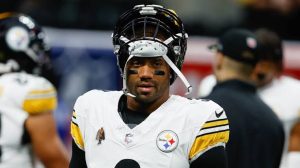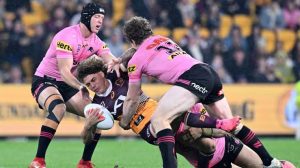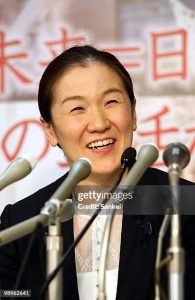
BREAKING NEWS : An Appropriate End To Blame Game In The Justin Field Saga is …..

Analysis: In the end, he failed to grab Justin Fields on draft day, despite high expectations and the expense of moving up to get him.
There is irony layered upon irony to the level of injustice in the sad case of Justin Fields.
The Bears kept him around for three years and expected him to deliver through two coaching regimes, two different offensive coordinators and two general managers.
Through it all they staged a total rebuild of the franchise by gutting the salary cap and dumping almost every veteran player of value.
The wide receiver corps was suspect at times. Byron Pringle? N’Keal Harry? Velus Jones Jr. Come on.
That’s all pretty tough.
And when they finally got him Keenan Allen to team with DJ Moore and Cole Kmet, along with running back D’Andre Swift and tight end Gerald Everett, they sent Fields packing for the equivalent of a pair of football cleats.
Fields’ spectacular running and occasionally brilliant passes always teased, but the end result was usually disappointment.
The Bears were no longer willing to take losses and chalk it up to learning after three seasons with the fifth-year option looming on his contract.
A Sixth-Round Pick Is Insulting
The contract situation is one major point why the Bears are willing to go forward. It’s part of the reason why they were able to gain so little back in return for Saturday’s trade to Pittsburgh—a conditional sixth-round pick in 2025.
Waivers almost would have been less insulting for Fields.
At least now he can leave life “in the gray,” as GM Ryan Poles had described it, and join the black and yellow.
It is with Poles where some of this embarrassment rests. It’s not necessarily for supplying Fields with an insufficient supporting cast. The embarrrassment is the return on investment.
What the price would have been in return for Fields if they simply had traded him sometime near the combine is unknown, but it’s difficult to believe it would have been anything close to what they eventually received.
No less of an “expert” on talent than Mel Kiper Jr. suggested the Bears could get a first-round draft pick for Fields back well before the combine.
A major reason their return on investment was so low in the end was lack of teams willing to take him at that point. The market was gone. By then, all of the musical chairs in the quarterback shuffle had filled.
The real problem in this dire
ction started when Poles announced he wanted to “do right by” Fields and didn’t want him to “live in the gray.”
This was a sure tip to other teams that the Bears planned to use the first pick for Caleb Williams and Fields would be expendable. It was telling them that the Bears didn’t value him much. So if the Bears didn’t value him, why should they? So Poles probably contributed to the low return himself.







